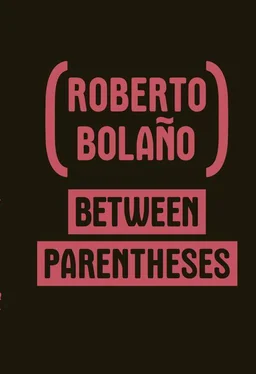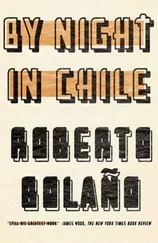Roberto Bolaño - Between Parentheses - Essays, Articles and Speeches, 1998-2003
Здесь есть возможность читать онлайн «Roberto Bolaño - Between Parentheses - Essays, Articles and Speeches, 1998-2003» весь текст электронной книги совершенно бесплатно (целиком полную версию без сокращений). В некоторых случаях можно слушать аудио, скачать через торрент в формате fb2 и присутствует краткое содержание. Год выпуска: 2011, Издательство: New Directions, Жанр: Публицистика, Критика, на английском языке. Описание произведения, (предисловие) а так же отзывы посетителей доступны на портале библиотеки ЛибКат.
- Название:Between Parentheses: Essays, Articles and Speeches, 1998-2003
- Автор:
- Издательство:New Directions
- Жанр:
- Год:2011
- ISBN:нет данных
- Рейтинг книги:4 / 5. Голосов: 1
-
Избранное:Добавить в избранное
- Отзывы:
-
Ваша оценка:
- 80
- 1
- 2
- 3
- 4
- 5
Between Parentheses: Essays, Articles and Speeches, 1998-2003: краткое содержание, описание и аннотация
Предлагаем к чтению аннотацию, описание, краткое содержание или предисловие (зависит от того, что написал сам автор книги «Between Parentheses: Essays, Articles and Speeches, 1998-2003»). Если вы не нашли необходимую информацию о книге — напишите в комментариях, мы постараемся отыскать её.
The Savage Detectives
Between Parenthese
Between Parentheses: Essays, Articles and Speeches, 1998-2003 — читать онлайн бесплатно полную книгу (весь текст) целиком
Ниже представлен текст книги, разбитый по страницам. Система сохранения места последней прочитанной страницы, позволяет с удобством читать онлайн бесплатно книгу «Between Parentheses: Essays, Articles and Speeches, 1998-2003», без необходимости каждый раз заново искать на чём Вы остановились. Поставьте закладку, и сможете в любой момент перейти на страницу, на которой закончили чтение.
Интервал:
Закладка:
HORACIO CASTELLANOS MOYA
The first person who talked to me about Castellanos Moya was Rodrigo Rey Rosa, after paella in Blanes with Ignacio Echevarría. The second person was Juan Villoro. This was some time ago now. Of course I tried, without much hope, to find his books at two bookstores in Barcelona, and, as I expected, I couldn’t find them. A little while later I received a letter from Castellanos Moya himself and after that we kept up an irregular and melancholy correspondence, tinged on my end by an admiration for his work, which little by little has come to populate my bookshelves.
So far I’ve read four of his books. The first was El asco [Nausea], maybe the best of all, or at least the darkest, a long tirade against El Salvador that caused Castellanos Moya to receive death threats obliging him to go into exile yet again. El asco , of course, isn’t just a settling of scores or a writer’s response to a moral and political situation that he finds profoundly discouraging, it’s also a stylistic exercise, a parody of certain works by Bernhard, and the kind of book that makes you laugh out loud. Sadly, very few people in El Salvador have read Bernhard, and fewer still have a sense of humor. One’s country is no laughing matter. That’s the word, and not just in El Salvador, but also in Chile and Cuba, Peru and Mexico, and even Austria and more than a few other European countries or regions. If Castellanos Moya were Bosnian or Kosovar and he had written and published this book in Bosnia or Kosovo, chances are he wouldn’t have had time to catch a plane out. Herein lies one of the book’s many virtues: nationalists can’t abide it. Its acid humor, like a Buster Keaton movie or a time bomb, threatens the hormonal stability of the idiots who, upon reading it, feel an irresistible urge to string the author up in the town square. Truly, I know of no greater honor for a real writer.
The second book I read was The She-Devil in the Mirror , a grim novel, in fact an extremely grim novel, though it’s narrated by a daddy’s girl or pampered princess or rich bitch from San Salvador, after the end of the civil war, when the country has moved fully into a no-holds-barred capitalism. The victim is a friend of the narrator, the wife of a businessman. The narrator’s voice — a voice full of tics, a voice brilliantly realized, a voice that leads us from a darkish room to a darker room and so on gradually to a room plunged in total darkness — is only one of its achievements. This book, I believe, is the first by Castellanos Moya to be issued in Spain, by the small publishing house Linteo.
The third book that I read is also out in Spain, from Casiopea, another small publishing house. It’s a reissue of El asco , preceded by two long stories: “Variaciones sobre el asesinato de Francisco Olmedo” [Variations on the Killing of Francisco Olmedo], a text that surely deserves a place in any anthology of contemporary Latin American short fiction, and “Con la congoja de la pasada tormenta” [With the Sorrow of the Spent Storm]. Both stories delve into the garbage pit of history, and, like crime novels, their premises are speculative, though they tumble (from the very beginning) toward a vaguely familiar horror, one that we know or have heard about.
The last book by Castellanos Moya to fall into my hands was the novel El arma en el hombre [The Human Weapon], published by Tusquets Mexico, which in a certain way expands upon matters dealt with in The She-Devil in the Mirror, the stories of some characters who were marginal or barely sketched and who here take center stage, like Robocop, a former soldier from an assault troop who, at the end of the war, is left without work and who decides (or maybe it’s decided for him) to become a killer for hire. One of his victims is Olga Trabanino, the close friend of the narrator of The She-Devil in the Mirror , and the crime is one also featured in El asco , so prominently that it could be said that the killer of that poor bourgeois housewife constitutes one of the focal points of Castellanos Moya’s fiction. The other focal points are horror, corruption, and a sense of the quotidian that trembles on every page and makes his readers tremble.
Horacio Castellanos Moya was born in 1957. He’s a melancholic and he writes as if from the bottom of one of his country’s many volcanoes. This sounds like magic realism. But there’s nothing magic about his books, except possibly the boldness of his style. He’s a survivor, but he doesn’t write like a survivor.
BORGES AND PARACELSUS
Like all men, like all living things on earth, Borges is inexhaustible. In one of his lesser-known books, Shakespeare’s Memory (1983), a slender collection of four stories, three of them previously published elsewhere plus one new one that lends the volume its title, the reader can find and read or reread “The Rose of Paracelsus,” a very simple text, diaphanous in execution, that describes how Paracelsus is visited by a man who wants to be his disciple. That’s all there is to it. The story is told with a kind of languor suited to the time of day, which is dusk. Paracelsus is tired and a small fire burns in the hearth. Then night falls and Paracelsus, who has dozed off, hears someone knocking. The stranger at the door wants to be his disciple.
The story begins like this: “Down in his laboratory, to which the two rooms of the cellar had been given over, Paracelsus prayed to his God, his indeterminate God — any God — to send him a disciple.” And the disciple, when the skies have long been dark, has come at last, and he hands Paracelsus a pouch full of gold coins and a rose. At first Paracelsus thinks that the disciple wants to become an alchemist, but the disciple soon clears up the misunderstanding. “Gold is of no interest to me,” he says. What does he want, then? The path to the Stone. To which Paracelsus replies: “The path is the Stone. The point of departure is the Stone. If these words are unclear to you, you have not yet begun to understand. Every step you take is the goal you seek.”
The stranger says that he’s ready to endure every necessary hardship alongside Paracelsus, but before he takes the final step he needs some proof. Paracelsus, troubled, doesn’t ask what proof he demands, but when he wants to see this proof. Immediately, the stranger answers. “They had begun their discourse in Latin; they now were speaking German,” writes Borges. “You are famed,” says the stranger, “for being able to burn a rose to ashes and make it emerge again, by the magic of your art. Let me witness that prodigy. I ask that of you, and in return I will offer up my entire life.”
From this point on, the conversation turns philosophical. Paracelsus asks if he believes anyone is capable of destroying a rose. No one is incapable, says the aspiring disciple. Paracelsus argues that nothing that exists can be destroyed. Everything is mortal, answers the stranger. “If you cast this rose into the embers,” says Paracelsus, “you would believe that it has been consumed, and that its ashes are real. I tell you that the rose is eternal, and that only its appearances may change. At a word from me, you would see it again.” The stranger is puzzled by this response. He insists that Paracelsus burn the rose and make it rise from the ashes, whether with alembics or with the Word. Paracelsus resists: he talks about semblances that sooner or later lead to disenchantment, he talks about faith and credulity, he talks about the search. The stranger takes the rose and throws it on the fire. It burns to ashes. The stranger, says Borges “for one infinite moment awaited the words and the miracle.” But Paracelsus doesn’t do anything, he just sits there sadly and is reminded of the physicians and pharmacists of Basilea who believe he’s a fraud. The stranger thinks he understands and tries not to humiliate him any further. He ceases his demands, takes back his gold coins, and politely leaves. Despite the love and admiration he feels for Paracelsus, vilified by all, he understands that under the mask there is nothing. And he asks himself: who am I to judge and expose Paracelsus? A little while later they bid each other farewell. Paracelsus accompanies the stranger to the door, telling him he’ll always be welcome in his house. The stranger promises to return. They both know they’ll never see each other again. Alone now, and before he puts out the lamp, Paracelsus scoops up the ashes and utters a single word in a low voice. And in his hands the rose springs back to life.
Читать дальшеИнтервал:
Закладка:
Похожие книги на «Between Parentheses: Essays, Articles and Speeches, 1998-2003»
Представляем Вашему вниманию похожие книги на «Between Parentheses: Essays, Articles and Speeches, 1998-2003» списком для выбора. Мы отобрали схожую по названию и смыслу литературу в надежде предоставить читателям больше вариантов отыскать новые, интересные, ещё непрочитанные произведения.
Обсуждение, отзывы о книге «Between Parentheses: Essays, Articles and Speeches, 1998-2003» и просто собственные мнения читателей. Оставьте ваши комментарии, напишите, что Вы думаете о произведении, его смысле или главных героях. Укажите что конкретно понравилось, а что нет, и почему Вы так считаете.












